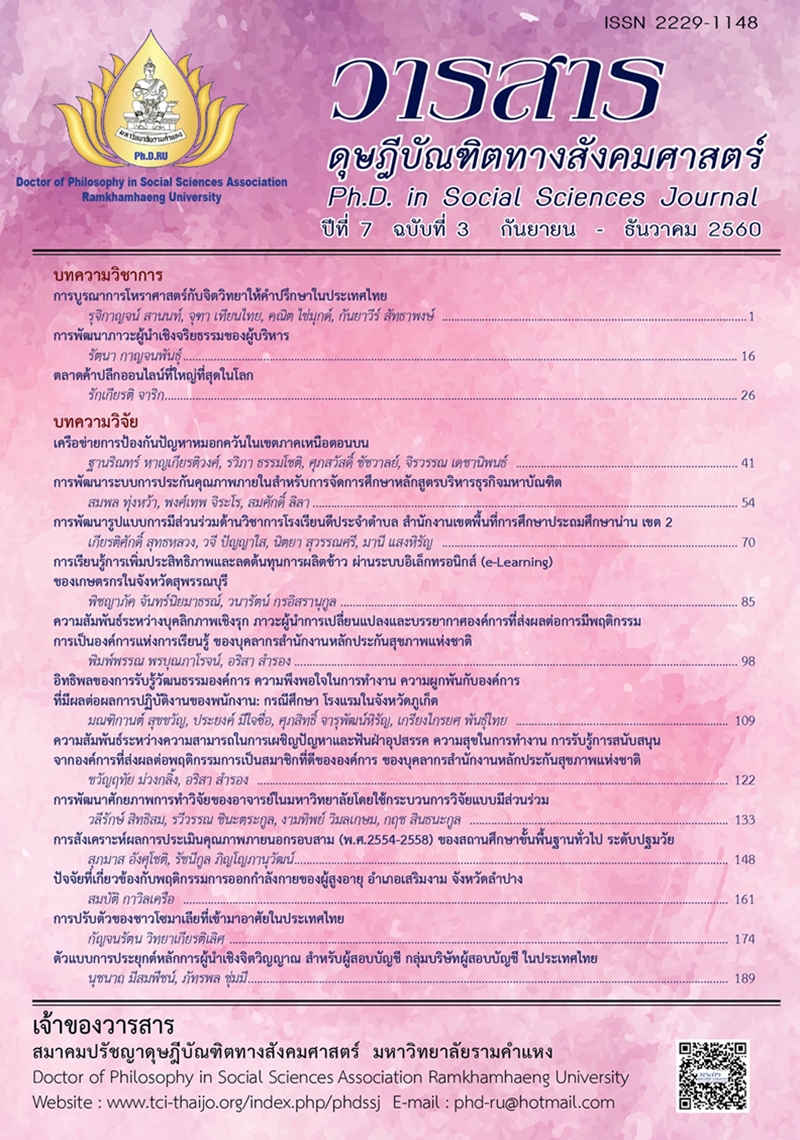การพัฒนาภาวะผู้นำเชิงจริยธรรมของผู้บริหาร
Main Article Content
Abstract
ผู้บริหารในสังคมปัจจุบัน โดยเฉพาะอย่างยิ่งอาชีพของผู้นำทางการศึกษา เป็นวิชาชีพของที่ต้องมีเหตุผลทางจริยธรรม ปัจจุบันมีความสำนึกด้านจริยธรรมน้อยลง การขาดจริยธรรมของผู้บริหารย่อมนำมาซึ่งความขัดแย้ง ความสับสนระหว่างความดีและความเลว ความควรไม่ควร ความถูกต้อง ไม่ถูกต้อง พัฒนาไปสู่การใช้กำลังเข้าทำร้ายทำลายกัน
การศึกษาเกี่ยวกับภาวะผู้นำเชิงจริยธรรม (ethical leadership) เกิดขึ้นมาเป็นระยะเวลานาน แต่ไม่มีการกล่าวถึงในประเด็นของการวิจัยอย่างชัดเจนนัก ดังเช่น การศึกษาของ Burns (1978) และ Gardner (1995) ต่อมาในระยะหลังจึงเริ่มมีความชัดเจนขึ้น ซึ่งจะเห็นได้จากของ Sergiovanni (1992) ที่กล่าวถึงภาวะผู้นำเชิงจริยธรรม ซึ่ง Jossey-Bass จัดพิมพ์ไว้ในหนังสือในปี ค.ศ.1992 ในระยะต่อมา การศึกษาเกี่ยวกับภาวะผู้นำเชิงจริยธรรม เริ่มมีการพูดถึงมากขึ้น เช่น งานของ Cole (2002) ที่นำเสนอแนวคิดเกี่ยวกับ Ethical leadership ว่าเป็นสิ่งที่เกิดจากความแตกต่างของการพัฒนาจริยธรรมซึ่งมีผลกระทบกับคนทุกคน ความน่าสนใจในงานของโคลส์ในหนังสือ คือ โคลส์ ได้นำเสนอแนวคิดภาวะผู้นำเชิงจริยธรรม โดยมิได้กล่าวถึงทฤษฎีทางจิตวิทยา แต่นำเสนอในเชิงบรรยายเกี่ยวกับชีวิตและเหตุการณ์ผ่านบทสนทนาที่สะท้อนสาระเกี่ยวกับจริยธรรมของผู้นำ ต่อมาในปี ค.ศ.2003 จึงปรากฏข้อเขียนเกี่ยวกับภาวะผู้นำเชิงจริยธรรมมากขึ้น ดังจะเห็นได้จากหนังสือของ Fullan (2003) มีความจำเป็นต้องพัฒนาภาวะผู้นำเชิงจริยธรรมของผู้บริหาร
ETHICAL LEADERSHIP DEVELOPMENT FOR MANAGER
Managers, especially in the profession of education, must possess ethical reasoning ability. Nonetheless, it appears that even conscience for ethical reasoning is on a decline-absent of such morality awareness would likely lead to confusion of what should be right or wrong, good or bad, and resulting in violent resolution.
There has been numerous studies in the past decades in regards to ethical leadership. Topic of studies in the earlier time such as Burns (1978) and Gardner (1995), respectively, covered ethical leadership in a more general scope (i.e., not exclusively ethical leadership). Specific study on this issue started by Sergiovanni in 1992 (ref. Jossey-Bass 1992) and began to strongly emphasize on relational topics e.g., Cole’ works in 2002 which proposes that ethical leadership is an upshot of differences in ethical development in different people. Interestingly, Cole presents the idea through narrative of daily lives and occurrences in which such issue matter most; however, Cole did not include, intentionally or not, how psychology principles may have affected development of ethics. Necessity for development of ethical leadership was in a full spotlight when Fullan presented his ideas in 2003.
Article Details
Academic articles, research articles, and book reviews in the Ph.D. in Social Sciences Journal are author’s opinions, and not the publisher’s, and is not the responsibility of the Ph.D. in Social Sciences Journal Philosophy Association, Ramkhamhaeng University. (In the case that research is done on human, the researcher has to be trained in Ethics for Doing Research on Human Training and has to produce the evidence of the training).


